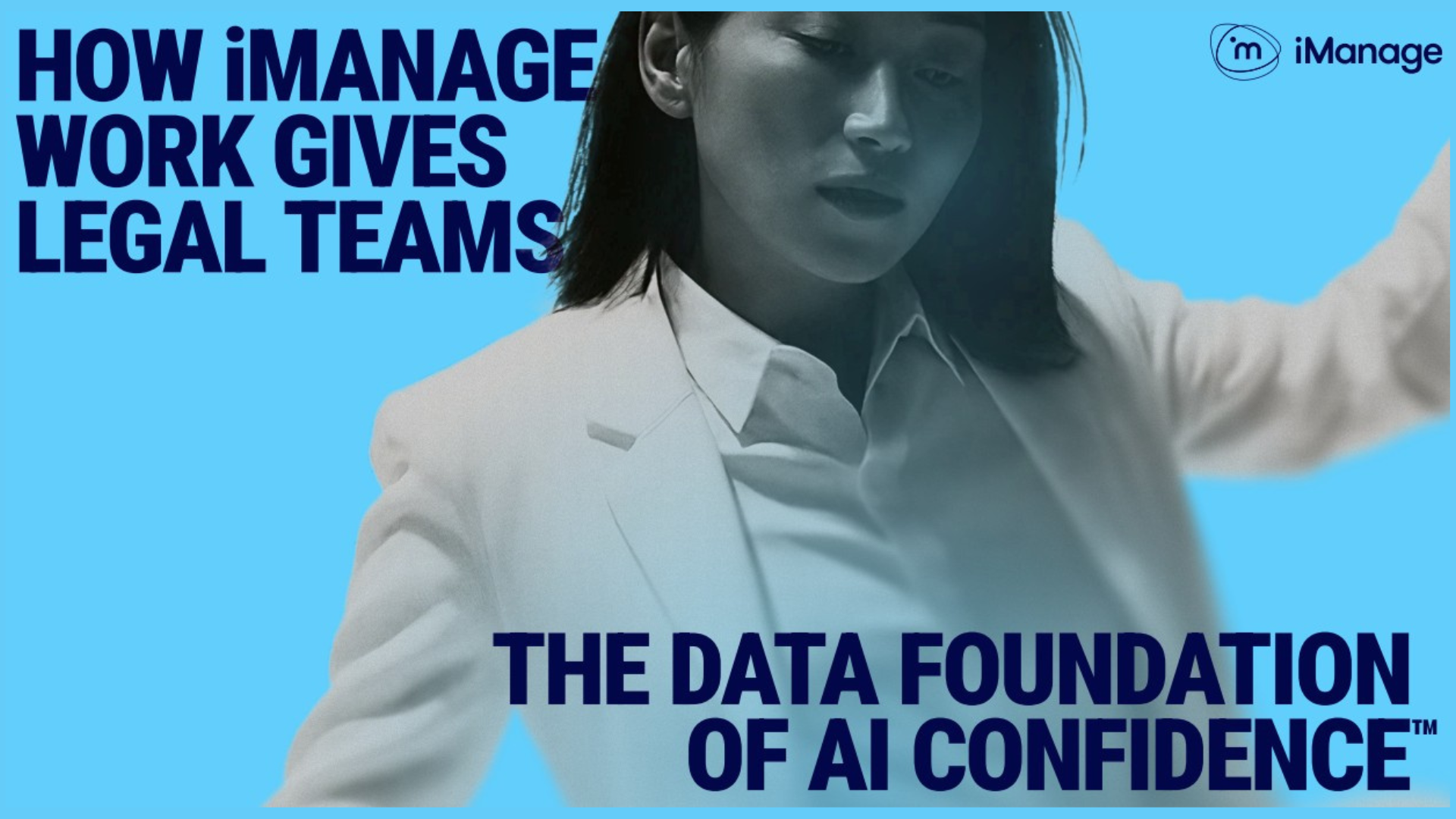Sponsored by iManage
What can AI do to empower those working in the legal sector today, tomorrow, and beyond?
AI is transforming the legal profession — from streamlining today’s workflows to shaping tomorrow’s strategies. For firms, the choice is clear: embrace trusted AI tools now or risk falling behind in a rapidly evolving landscape

The legal profession, long steeped in tradition and precedent, is undergoing a seismic shift. Artificial Intelligence (AI), once a distant concept, is now a powerful ally in the hands of lawyers, paralegals, and legal researchers.
In the 2025 Thomson Reuters’ Future of Professionals Report, 80% of legal professionals responded that they believe AI will have a high or transformational impact on their work within the next five years.
Other industry research shows similar interest in the potential for AI in a legal setting. Indeed, a LexisNexis report entitled ‘Fast law: why speed is the priority for lawyers using AI’ surveyed more than 800 legal professionals for their views on AI. It found that 82% are either using AI now or plan to use it. What’s more, 71% of respondents said the main benefit would be getting things done more quickly.
Other industry research shows similar interest in the potential for AI in a legal setting. Indeed, a LexisNexis report entitled ‘Fast law: why speed is the priority for lawyers using AI’ surveyed more than 800 legal professionals for their views on AI. It found that 82% are either using AI now or plan to use it. What’s more, 71% of respondents said the main benefit would be getting things done more quickly.
From streamlining document review to predicting case outcomes, AI is not just enhancing productivity — it’s redefining what’s possible. But as we look toward the future, the question isn’t just what AI can do. It’s what the legal sector stands to lose if it doesn’t embrace this transformation.
Today’s empowerment: AI as a legal assistant
In today’s legal landscape, AI is already making waves. Tools powered by machine learning (ML) and natural language processing (NLP) are helping legal professionals automate routine tasks and enhance decision-making.
Document review, contract analysis, and legal research can now be completed in minutes rather than hours. AI tools can sift through thousands of pages to identify relevant clauses, precedents, or inconsistencies. Predictive analytics tools assess historical case data to forecast outcomes, helping lawyers build stronger strategies and advise clients with greater confidence.
These capabilities are not just about efficiency — they’re about empowerment. Lawyers can focus on higher-value tasks, clients receive faster service, and legal teams operate with greater agility.
Tomorrow’s transformation: AI as a strategic partner
Looking ahead, AI’s role in the legal sector will evolve from assistant to strategic partner. "Activities such as legal research, document review, and contract analysis will become simpler and quicker, allowing lawyers to concentrate on complex and strategic work," according to Bhavisa Patel, director of legal technology at Eversheds Sutherland, as quoted in the LexisNexis report.
We’re entering an era where AI won’t just support legal work — it will help shape it with exciting new use cases, such as:
- Dynamic legal drafting: AI will generate contracts and legal documents tailored to specific jurisdictions, industries, and risk profiles, reducing human error and ensuring compliance.
- Real-time legal intelligence: AI will monitor regulatory changes, case law updates, and global legal trends, alerting professionals to shifts that impact their clients or practice areas.
- Augmented litigation: AI will simulate courtroom scenarios, analyze opposing counsel’s strategies, and even suggest optimal jury selection based on behavioral data.
This future isn’t science fiction — it’s already emerging. But it hinges on one critical factor: trust.
The foundation of confidence: trusted document management systems (DMS)
AI confidence isn’t just about technical performance — it’s about trust. AI’s effectiveness in the legal sector depends on the quality and integrity of the data it accesses. Legal professionals must trust that AI tools are accurate, secure, and aligned with ethical standards.
That trust begins with a solid foundation — a robust Document Management System (DMS) that ensures:
- Data accuracy: Clean, well-organized legal documents produce more reliable insights.
- Security and compliance: Legal data is sensitive. A trusted DMS protects client confidentiality and ensures compliance with regulations like the General Data Protection Regulation (GDPR) and Health Insurance Portability and Accountability Act (HIPAA).
- Version control and audit trails: Legal professionals need to know who accessed what, when, and why. A DMS provides transparency and accountability.
Without a trusted DMS, AI becomes a potential liability rather than an asset. Poor data leads to flawed analysis. Security breaches erode client trust. And legal teams risk making decisions based on outdated or incorrect information.
Future challenges: What lies ahead
As AI becomes more embedded in legal workflows, the sector will face new challenges, including ethical dilemmas, regulatory uncertainty, and talent transformation.
Governments are still grappling with how to regulate AI to ensure fair and equitable outcomes under the law. Legal professionals must stay ahead of evolving standards and ensure their tools comply. As AI takes over routine tasks, legal professionals must upskill. The future lawyer will need to understand data science, AI ethics, and digital strategy.
In the LexisNexis report, Jonathan Kewley, partner and co-chair of the Global Tech Group at Clifford Chance, explains: "It's important that lawyers are familiar with AI technology in the same way they are with the internet now. Those that don't use it will face a bit of an existential risk."
These challenges are not insurmountable — but they require proactive adaptation. Firms that invest in AI literacy, ethical frameworks, and trusted infrastructure will thrive. Those that don’t risk:
- Competitive disadvantage: Firms using AI will deliver faster, more accurate, and more cost-effective services. Those relying solely on manual processes will struggle to compete.
- Client dissatisfaction: Clients increasingly demand transparency, speed, and data-driven insights. Without AI, firms may fail to meet these expectations.
- Talent drain: Newer legal professionals expect modern tools. Firms that resist innovation may find it harder to attract and retain top talent.
Failing to embrace AI isn’t just a missed opportunity — it’s a strategic risk.
Reshaping the legal landscape
AI is not just a tool — it’s a catalyst for transformation.
In the legal sector, it’s empowering legal professionals to work smarter, serve more people, and deliver legal services in new ways. From today’s research assistants to tomorrow’s strategic advisors and beyond, AI is reshaping the legal landscape with speed, precision, and possibility.
Sign up today and you will receive a free copy of our Future Focus 2025 report - the leading guidance on AI, cybersecurity and other IT challenges as per 700+ senior executives

Lawrence Miller, CISSP, has worked in information security and technology management for more than 25 years.
He received his MBA in Supply Chain Management from Indiana University and has earned numerous technical and professional certifications throughout his career.
He is currently working as an IT security solutions consultant. He’s previously worked as the vice president of IT for a major Verizon reseller, director of IT and e-commerce for a retail merchandising company, and IT operations manager for a top 100 U.S. law firm.
-
 The Data Foundation of AI Confidence
The Data Foundation of AI Confidencewhitepaper
-
 Tired of legal AI tools that overpromise but underdeliver? The secret to success is in your firm’s data
Tired of legal AI tools that overpromise but underdeliver? The secret to success is in your firm’s dataSponsored Don't let legal AI tools overpromise and underdeliver: the secret to success isn't the software, but building a secure, stable, and connected data foundation that transforms your firm's complex, siloed information into structured knowledge.
-
 Yes, legal AI. But what can you actually do with it? Let’s take a look…
Yes, legal AI. But what can you actually do with it? Let’s take a look…Sponsored Legal AI is a knowledge multiplier that can accelerate research, sharpen insights, and organize information, provided legal teams have confidence in its transparent and auditable application
-
 AI in the legal sector: How to separate the signal from the noise
AI in the legal sector: How to separate the signal from the noiseSupported From contract review to litigation strategy, AI promises efficiency. But with so much noise in the market, legal professionals must know how to spot tools that deliver real value
-
 How AI can help rather than hinder knowledge workers in the legal profession
How AI can help rather than hinder knowledge workers in the legal professionSupported AI won’t replace lawyers — it empowers them. Free from routine tasks, legal pros can focus on strategy, judgment, and client success
-
 AI legal confidence: What is it and how do you get there?
AI legal confidence: What is it and how do you get there?Supported AI is reshaping legal practice, but doing so successfully comes down to building trust and confidence...
-
 Legal professionals face huge risks when using AI at work
Legal professionals face huge risks when using AI at workAnalysis Legal professionals at a US law firm have been sanctioned over their use of AI after it was found to have created fake case law.
-
 The future of AI in the legal industry
The future of AI in the legal industryIn-depth It’s an industry that can be traced back to ancient Greece and Rome but how will artificial intelligence catapult the legal profession into the 21st century?


